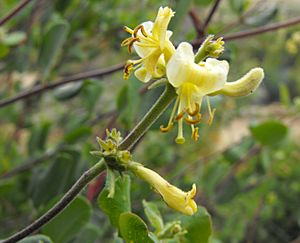Southern honeysuckle facts for kids
Quick facts for kids Southern honeysuckle |
|
|---|---|
 |
|
| Conservation status | |
| Scientific classification | |
| Genus: |
Lonicera
|
| Species: |
subspicata
|
The Lonicera subspicata, also known as southern honeysuckle, is a special kind of honeysuckle plant. It is only found in California, in mountain and coastal areas. You can often see it growing in places called chaparral, which are dry areas with shrubs.
This plant is a vining shrub. This means it grows like a vine and often climbs on other plants to help it stand up. It can grow quite long, sometimes more than two meters!
What Southern Honeysuckle Looks Like
The southern honeysuckle has oval-shaped leaves. These leaves can be up to 4 centimeters long.
Its Flowers and Fruits
The plant produces a long, fuzzy spike of light yellow flowers. Each flower is about one centimeter long. The flowers have two main parts, an upper lip and a lower lip. Inside, you can see hairy stamens and a style sticking out. These are parts of the flower that help it make seeds.
After the flowers bloom, they turn into small fruits. These fruits are round berries. They can be red or yellow and are just under a centimeter wide.
Different Types of Southern Honeysuckle
There are at least two main types, or varieties, of southern honeysuckle.
- One variety is called denudata. People in Mexico sometimes call it "moronel."
- The other variety is called subspicata. This type is mostly found in Santa Barbara County in California.


